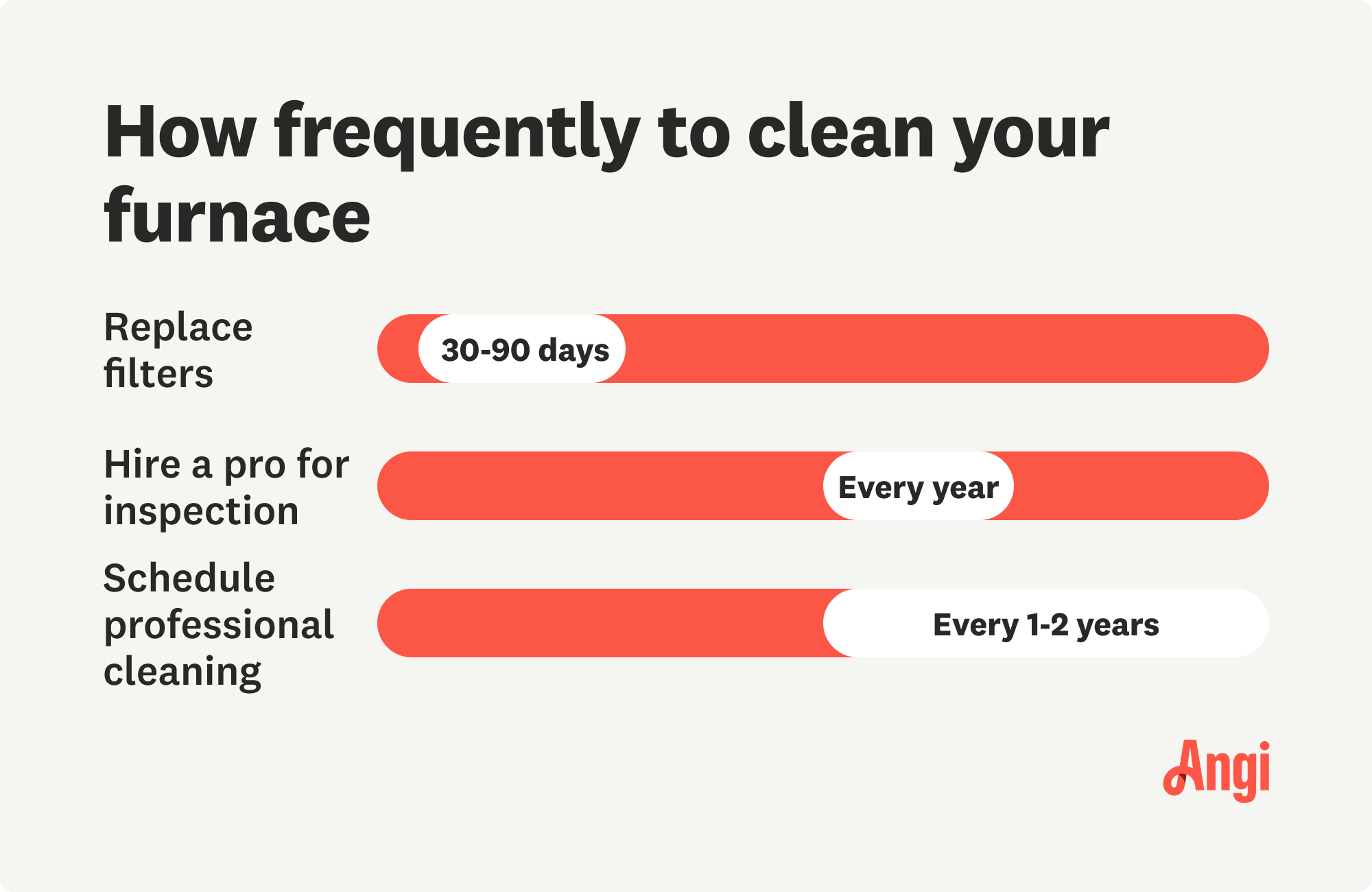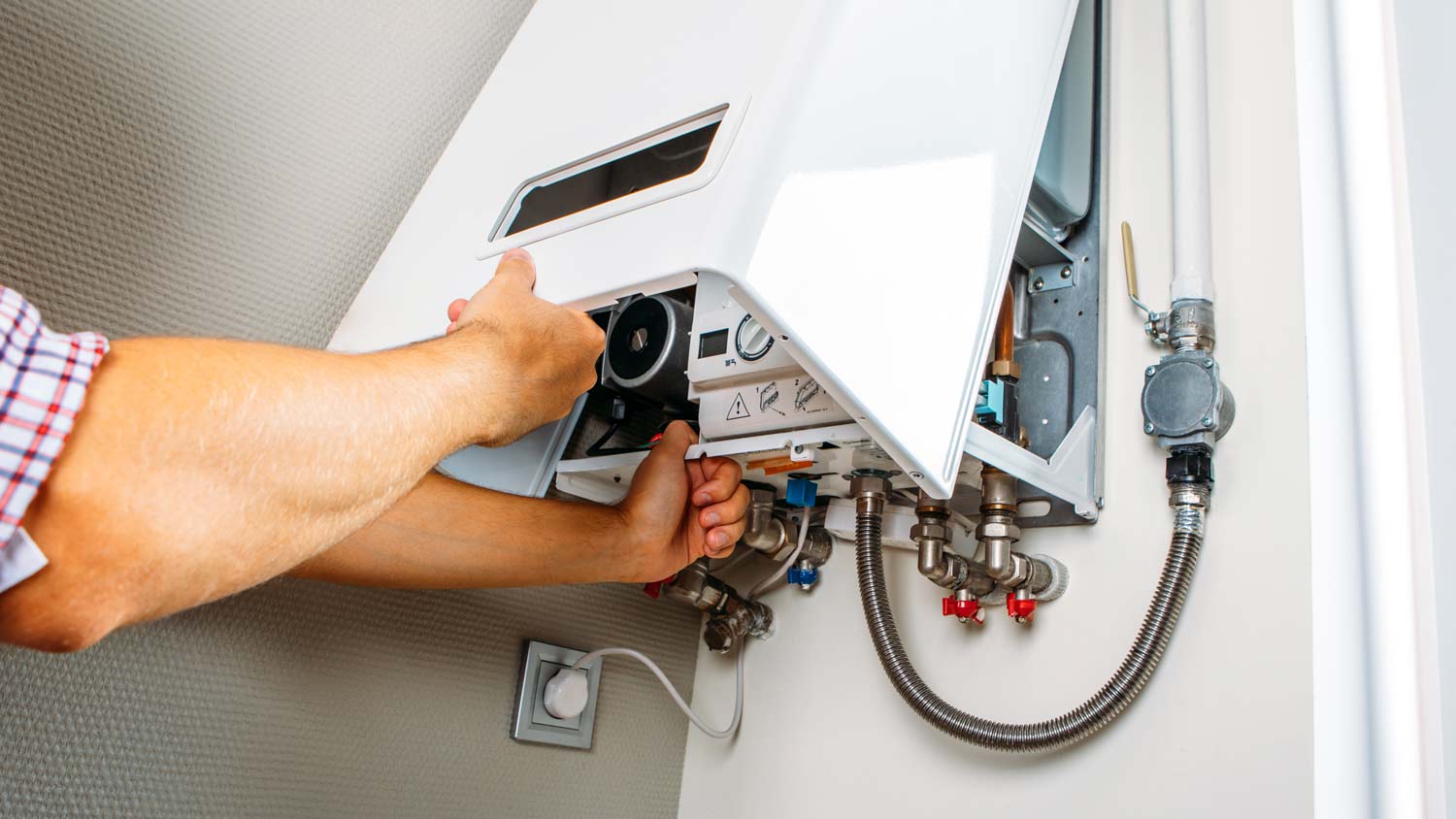
Explore how much an AC compressor costs to install based on cost factors like it’s type, brand, size, and local labor rates.
Heating and air conditioning service costs depend on your project and location. Check with a local pro for your specific job.
Charlotte, North Carolina, experiences mild but chilly winters, so it’s important to have a reliable furnace.
The cost of a new furnace is affected by home size, energy efficiency, furnace type, labor rates, and other factors.
Charlotte homes often need furnaces with between 54,000 and 112,500 BTUs.
A mechanical permit is required for furnace installation in Charlotte, which also raises the price.
The cost of a new furnace in Charlotte, North Carolina, is $5,208, though most homeowners spend between $3,707 and $7,028. Home size is one of the biggest cost factors, but energy efficiency, furnace type, and labor rates also affect the price. Facing a furnace replacement can feel daunting, but it might be a necessity during winters in Charlotte, when temperatures tend to hover around the mid-30s to mid-50s Fahrenheit.
The cost of a new furnace in Charlotte, NC, isn't one-size-fits-all. Here's a breakdown of the key factors that contribute to the overall price.
Furnace capacity is measured in British Thermal Units (BTUs), which is the energy needed to raise the temperature of one pound of water by one degree Fahrenheit. A larger home requires a higher-BTU furnace, which translates to a higher cost.
In Charlotte, the average home is between 1,800 and 2,500 square feet. Because of the climate in North Carolina, you’ll need 30 to 45 BTUs per square foot. This means you might need a furnace with 54,000 to 112,500 BTUs to adequately heat your space. Factors that sway this number include insulation levels and energy efficiency.
A furnace installation pro in Charlotta, North Carolina, can help you choose the right furnace capacity. The table below explains how furnace size affects the price:
| Home Size (Square Feet) | Furnace Size (BTUs) | Average Material Cost |
|---|---|---|
| 1,200 | 36,000–72,000 | $1,000–$4,450 |
| 1,500 | 45,000–90,000 | $2,040–$5,570 |
| 1,800 | 56,700–113,400 | $2,441–$6,683 |
| 2,000 | 60,000–120,000 | $2,720–$6,850 |
| 2,250 | 67,500–135,000 | $3,060–$7,000 |
| 2,500 | 75,000–150,000 | $3,400–$7,350 |
| 3,000 | 90,000–180,000 | $4,080–$8,830 |
| 3,500 | 105,000–210,000 | $4,760–$10,300 |
In Charlotte, North Carolina, the most common type of furnace is natural gas. These units offer a good balance of affordability and efficiency, but they require a gas line (which many homes already have) and regular HVAC maintenance.
Homeowners can also choose an electric furnace, which is the least expensive option up front. Operating costs can be higher in colder climates, making electric furnaces best for milder weather or smaller spaces. Oil and propane furnaces are less common in Charlotte because they’re more costly to install and maintain.
Here’s what you might pay for each type of furnace in Charlotte, along with their advantages and disadvantages:
| Furnace Type | Average Cost | Pros | Cons |
|---|---|---|---|
| Natural gas | $3,800–$10,000 | Most affordable fuel source, provides consistent heat | Requires natural gas line, more complex maintenance needed |
| Electric | $2,000–$7,000 | Lower up-front cost, simpler installation, longer lifespan | Higher operating costs, heat can feel “dry” |
| Propane | $3,700–$12,500 | Strong and effective heating | Higher fuel costs, requires storage tank on property |
| Oil | $6,500–$10,000 | Long-lasting, robust heating, durable | Higher operating costs, requires storage tank on property |
Another furnace cost factor is energy efficiency, which is measured by the annual fuel utilization efficiency (AFUE) rating. Higher AFUE ratings mean greater efficiency and lower energy bills, but they also have larger up-front costs.
Here’s how a furnace’s energy efficiency affects the unit’s cost:
| Performance | AFUE Rating | Average Cost |
|---|---|---|
| High-efficiency | 96% or higher | $6,000–$10,000+ |
| Mid-efficiency | 90%–95% | $4,000–$7,500 |
| Low-efficiency | 80%–89% | $2,500–$4,500 |
If your existing ductwork is outdated, damaged, or incompatible with your new unit, you’ll need to repair or replace it. The cost to replace air ducts in Charlotte, North Carolina, is between $401 and $1,573.
Removal and disposal of your old unit is often included in the final bill. You can ask your local furnace installation pro for details, but expect to pay $60 to $300 for furnace disposal.
Here’s what you can expect to pay for labor and related expenses. The cost of living in Charlotte is slightly lower than the national average, and this is often reflected in project quotes.
Labor costs for new furnace installation in Charlotte, NC, span between $1,000 and $4,000. The final price depends on how complex the installation ends up being. For example, the price will rise for new ductwork or conversion to a different fuel type. Work done in an inconvenient location, such as a small crawl space, will also be more costly.
Mecklenburg County (which includes Charlotte) requires a mechanical permit for the installation or replacement of a heating or air conditioning system. This ensures the work follows safety protocols and building codes, but your HVAC contractor will deal with obtaining a permit. Expect to pay $250 to $400 for the permit, including the contractor’s administrative costs.

While a new furnace doesn’t offer the biggest return on investment in terms of home improvement projects, it still increases home value in Charlotte, North Carolina. Most prospective homebuyers will be put off by a failing or outdated furnace, while a new furnace (especially a high-efficiency model) will remove this problem. Buyers will also enjoy the peace of mind that comes with a newer furnace, especially when faced with chilly winter temperatures in Charlotte.
Home is the most important place on earth, which is why Angi has helped more than 150 million homeowners transform their houses into homes they adore. To help homeowners with their next project, Angi provides readers with the most accurate cost data and upholds strict editorial standards. We survey real Angi customers about their project costs to develop the pricing data you see, so you can make the best decisions for you and your home. We pair this data with research from reputable sources, including the U.S. Bureau of Labor Statistics, academic journals, market studies, and interviews with industry experts—all to ensure our prices reflect real-world projects.
Want to help us improve our cost data? Send us a recent project quote to [email protected]. Quotes and personal information will not be shared publicly.
From average costs to expert advice, get all the answers you need to get your job done.

Explore how much an AC compressor costs to install based on cost factors like it’s type, brand, size, and local labor rates.

What you’ll pay in Columbus, OH, for furnace repairs depends on many factors. Here’s a breakdown of what can go wrong and the cost to fix those issues.

Here's what you can expect when getting an estimate for coolant leak repair costs. The cost can vary based on the detection method used, the source of the leak, and the amount of damage that needs to be repaired in the aftermath.

Learn how to reset your boiler safely with our comprehensive guide. Don't let heating issues disrupt your comfort this winter.

If you need to repair a gas boiler or radiator heating system, you should first talk to a pro. Here are the top radiator repair questions you should ask.
How to clean your air conditioner depends on the unit type. Sometimes, a good hose-down is all you need if you have centralized AC. This guide can help with the cleaning process.